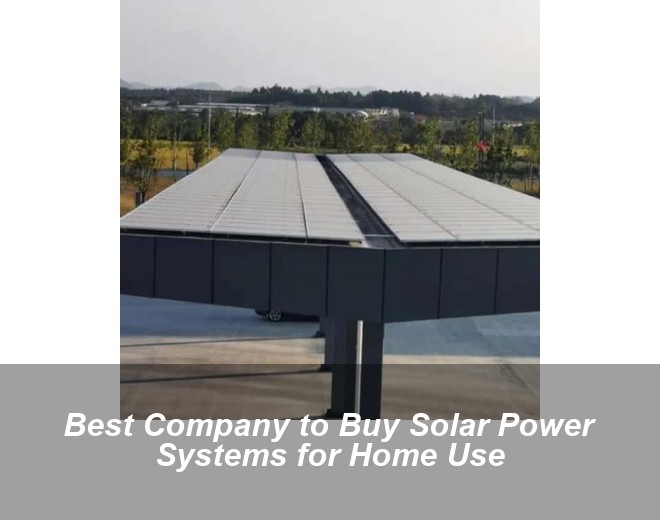Best Company to Buy Solar Power Systems for Home Use

Table of Contents
Why Go Solar Now?
Let's face it – electricity bills are getting out of control. The average U.S. household spent $1,856 on energy in 2023, with prices jumping 12% since 2020. But here's the kicker: solar panel costs have actually dropped 52% over the same period. Makes you wonder – why aren't more people switching?
Well, the hesitation often comes down to choosing the best company to buy solar power systems for home use. I've seen homeowners get paralyzed by options – local installers versus national brands, leased systems versus purchases. Just last month, a neighbor almost signed with a fly-by-night operator before I stepped in. "But their quote was $3,000 cheaper!" she argued. Turns out their panels used 2018-era technology with half the efficiency of current models.
What Makes a Solar Provider Stand Out?
When evaluating the top solar providers, three factors really matter:
- Warranty coverage (look for 25+ years)
- Panel efficiency ratings (22%+ is competitive)
- Local permitting expertise (this can make or break timelines)
Take SunPower – they're sort of the Apple of solar. Their Maxeon panels hit 22.8% efficiency, backed by a 25-year warranty covering both equipment and power output. But here's the catch – premium brands might cost 15-20% more than budget options. Is that worth it? Let's crunch numbers...
2024's Top Home Solar Providers
The U.S. market's buzzing with options, but three companies consistently outperform:
1. Tesla Solar
Love them or hate them, their Solar Roof tiles have revolutionized aesthetics. While their 19.3% panel efficiency isn't class-leading, the Powerwall integration makes them a complete energy solution. Just don't expect hand-holding – their DIY approach frustrates some customers.
2. SunPower
The efficiency champs. Perfect for homes with limited roof space. Their microinverters handle shade better than most – crucial for leafy suburbs. But wait, their installer network can be patchy in rural areas.
3. ADT Solar
Formerly SunPro, they've installed over 40,000 systems. What's cool? They price-match competitors and offer 24/7 monitoring. Downside? Limited battery storage options compared to Tesla.
The Hidden Installation Trap
Here's what most blogs won't tell you – the best solar companies aren't always the biggest. Local installers often navigate permits faster. In Austin, Texas, Freedom Solar cut my friend's approval time from 8 weeks to 12 days by knowing county inspectors personally. But how do you vet these smaller players?
Check NABCEP certification – it's like the CPA license for solar installers. Also, ask for at least three nearby references. If they can't provide any, that's a red flag waving harder than a tarp on a windy roof.
Location, Location, Location
Solar economics vary wildly by region. Take California – with high electricity rates (30¢/kWh) and sweet incentives, payback periods average 5-7 years. But in Texas (12¢/kWh), it stretches to 8-10 years.
Funny story – when I helped my cousin in Phoenix choose a home solar system, we found 400W panels underperformed in 115°F heat. Turns out, temperature coefficients matter more than specs sheets suggest. We switched to Panasonic's HIT panels designed for desert climates – their output dipped only 0.26% per degree above 77°F versus the industry average 0.35%.
Q&A: Your Top Solar Questions Answered
Q: Can I really go off-grid with home solar?
A: Technically yes, but battery costs add $10,000-$20,000. Most homes stay grid-tied for reliability.
Q: What happens during power outages?
A: Without batteries, solar shuts off automatically – safety requirement. Add a Powerwall or similar, and you'll keep the lights on.
Q: How long until I break even?
A: With federal tax credits, typically 6-12 years depending on local rates and sun exposure.
Q: Do solar panels increase home value?
A: Zillow says yes – about 4.1% on average. But leased systems complicate sales.
Related Contents

Best Solar and Wind Power for Florida Home
You're paying $126/month average for electricity in Florida - 8% higher than the national average. But wait, there's more. With hurricane season intensifying (remember Idalia's 125 mph winds last August?), solar power paired with battery storage isn't just about savings anymore - it's becoming survival tech.

Best Solar Power Inverter for Home
Ever wondered why neighbors with similar solar panels get better energy yields? The secret sauce often lies in their solar power inverter. This unsung hero converts DC electricity from panels into usable AC power – and choosing the right one can boost your system’s efficiency by up to 25%.

Best Way to Get Solar Power for Your Home
Ever wondered why your neighbor's electricity bill dropped 60% last summer? The best way to get solar power for your home isn't just about saving money – it's becoming a cultural shift. In the U.S. alone, residential solar installations grew 34% year-over-year, with states like California seeing 1 in 3 new homes sporting rooftop panels.

Best Way to Store Solar Power at Home
Let's face it – solar panels alone aren't enough anymore. Storing solar power at home has become crucial as energy bills skyrocket worldwide. In California, for instance, households using solar without storage still pay 40% more in utility fees compared to those with batteries. But what's driving this shift?

Best Home Solar Power Bank
your electricity bill's been acting like a rebellious teenager lately, right? With blackouts increasing 78% in the U.S. since 2015 according to DOE reports, the best home solar power bank isn't just a luxury anymore. It's become sort of like an insurance policy against dark nights and spoiled groceries.




 Inquiry
Inquiry Online Chat
Online Chat